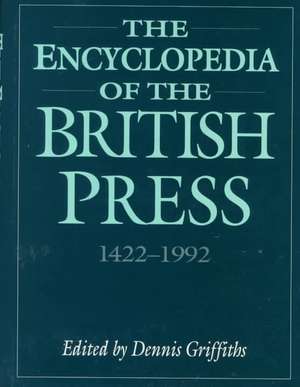The Encyclopedia of the British Press, 1422-1992
Editat de Dennis Griffithsen Limba Engleză Hardback – 31 dec 1992
The Encyclopedia of the British Press is a long awaited reference book, invaluable for journalists, historians and anyone interested in the history of newspapers. It contains biographies of editors, journalists, press magnates and other people with a formative influence on the British Press since 1422. Together they form a rich archive with entries covering a wide range of people: famous newspaper dynasties such as the Aitkens, Berrys and Harmsworths; newspaper giants, such as Caxton, and Daniel Defoe, regarded by many as the "father of English journalism"; and at the other end of the spectrum low-life characters such as the nineteenth century editor, Charles Westmacott, who used his paper as a vehicle for blackmail, and Henry Bate, known as the 'fighting parson' for the duels he fought whilst editor of the Morning Post. Entries on newspapers include all the present nationals and regionals, as well as many historical papers, such as the Pall Mall Gazette, North Briton, Daily Courant, Charles Dickens' Household Words and The Review, launched in 1713, which was the first paper to offer opinion on political affairs - the forerunner of modern editorials. The encyclopedia opens with a series of six definitive essays charting the long and chequered career of the British Press from 1476 when William Caxton set up the first press in Westminster, and his apprentice Wynkyn de Worde started the first printing business in Fleet Street.
Preț: 1356.67 lei
Preț vechi: 1654.47 lei
-18% Nou
Puncte Express: 2035
Preț estimativ în valută:
259.63€ • 281.92$ • 218.09£
259.63€ • 281.92$ • 218.09£
Carte indisponibilă temporar
Doresc să fiu notificat când acest titlu va fi disponibil:
Se trimite...
Preluare comenzi: 021 569.72.76
Specificații
ISBN-13: 9780312086336
ISBN-10: 0312086334
Pagini: 640
Dimensiuni: 198 x 253 x 38 mm
Greutate: 1.31 kg
Editura: Palgrave MacMillan
ISBN-10: 0312086334
Pagini: 640
Dimensiuni: 198 x 253 x 38 mm
Greutate: 1.31 kg
Editura: Palgrave MacMillan
Textul de pe ultima copertă
The Encyclopedia of the British Press is a long awaited reference book, invaluable for journalists, historians and anyone interested in the history of newspapers. It contains biographies of editors, journalists, press magnates and other people with a formative influence on the British Press since 1422. Together they form a rich archive with entries covering a wide range of people: famous newspaper dynasties such as the Aitkens, Berrys and Harmsworths; newspaper giants, such as Caxton, and Daniel Defoe, regarded by many as the "father of English journalism"; and at the other end of the spectrum low-life characters such as the nineteenth century editor, Charles Westmacott, who used his paper as a vehicle for blackmail, and Henry Bate, known as the 'fighting parson' for the duels he fought whilst editor of the Morning Post. Entries on newspapers include all the present nationals and regionals, as well as many historical papers, such as the Pall Mall Gazette, North Briton, Daily Courant, Charles Dickens' Household Words and The Review, launched in 1713, which was the first paper to offer opinion on political affairs - the forerunner of modern editorials. The encyclopedia opens with a series of six definitive essays charting the long and chequered career of the British Press from 1476 when William Caxton set up the first press in Westminster, and his apprentice Wynkyn de Worde started the first printing business in Fleet Street. It follows the changing patterns of newspapers from the seventeenth century - when many were opposed to newspapers on the grounds that "it makes the Multitude too familiar with the actions and Counsels of their superiors" (Sir Roger L'Estrange 1663), - to the suddengrowth of the provincial press in the eighteenth century, changes in distribution in the nineteenth century, abolition of the stamp tax, and finally the revolutionary changes of the twentieth century which included the unprecedented leap in circulation after the First World War, the concentration of papers in the hands of a few press barons in the thirties, wartime privations, growth of free newspapers, and finally the advent of new technology in the 1980s and the bitter labour disputes that ensued. In addition the encyclopedia contains a detailed chronology, numerous appendices, lists of editors of each newspaper, and finally an exhaustive bibliography arranged by subject. In 1881 Charles Pebody wrote "It ought to be one of the most interesting works upon our library shelves ... never was an institution better deserved to have its history written than the Newspaper Press". Over a century later this ground-breaking encyclopedia is published specifically to redress the balance.
